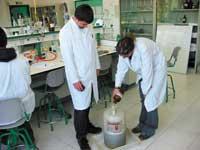SARE quality model
But this concept of quality is new. Initially, quality was associated with product control.
It was observed whether the product met the specifications or not and the most important thing was that defective products did not reach customers. That first idea of quality changed in a short time: it was to ensure quality. Quality defined the steps to be taken to avoid defective products and ensure production. Finally, we have taken the third step and have reached the concept of total quality.

And this new concept proposes to extend the philosophy of quality to all the activities of institutions or centers. Continuous improvement must be applied in all processes and activities.
However, to carry out this implementation of quality, the model contemplates three major steps: the design of the teaching-learning process, the implementation of the basic processes of the certification system and, thirdly, the implementation of the processes that are missing to achieve total quality. Once this third phase is completed and the certification system is consolidated, it is possible to self-evaluate the EFQM model. If the result of self-assessment is above 400 points, there is the path to Silver Q through an external audit.
However, as we know, Silver Q is not the only quality certification, nor the only quality model. Examples of this are the certifications that the centers have obtained in the implementation of quality: There are 32 centers with ISO 9000, 6 with Silver Q of the EFQM system and 1 with ISO 14001. The EFQM model of excellence is a European reference of total quality that includes management level standardizations such as ISO 9000.
Environmental management and ISO 14001
There is a new higher grade training cycle between vocational training cycles: environmental management. In the course 1997-1998 this cycle was launched at the IES Txindoki-Alkartasuna, thus anticipating what would soon be necessary. Today, many companies are seriously working on the implementation of quality systems and obtaining the corresponding certifications. Consequently, for the implementation of these systems there has emerged the need to have specialized people and, of course, the adaptation of studies.

This is what the Txindoki-Alkartasuna Institute did. He launched an increasingly important environmental management offer and not only that: in order for students to know closely what environmental management was, the system was implemented in the institute. Thus, it became the first center to obtain ISO 14001 certification in the Autonomous Community of the Basque Country in 2002.
Since then, together with Ihobe, they have developed a guide for the implementation of an environmental management system that now participates as a model of the other centers in the ISO groups.





